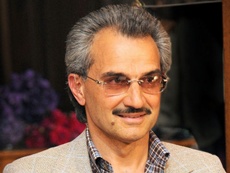Billionaire Prince Alwaleed among those held in sweeping Saudi purge
06 Nov 2017
Saudi Arabia carried out a sweeping purge of the kingdom's upper ranks on Saturday and Sunday, saying it would freeze the accounts of dozens of princes, ministers and a tycoon arrested as the crown prince cements his hold on power.
 | |
| Saudi royal billionaire Prince Al-Waleed bin Talal |
Crown Prince Mohammed bin Salman, Saudi Arabia's heir to the throne, is overseeing the unprecedented wave of arrests of dozens of the country's most powerful princes, military officers, influential businessmen and government ministers – including some potential rivals or critics of the crown prince as he consolidates his power.
Prominent billionaire Prince Al-Waleed bin Talal (also spelt Alwaleed), one of the world's richest men with extensive holdings in Western companies, was among the princes arrested late Saturday, along with two of the late King Abdullah's sons.
The arrests came immediately after a new anti-corruption commission headed by Crown Prince Salman was established by royal decree.
Separately, the head of the Saudi National Guard, once a leading contender to the throne, as well as the navy chief and the economy minister were replaced in a series of high-profile sackings that sent shock waves through the kingdom.
The arrest of senior princes upends a longstanding tradition among the ruling Al Saud family to keep their disagreements private in an effort to show strength and unity in the face of Saudi Arabia's many tribes and factions. It also sends a message that the 32-year-old crown prince, Mohammed bin Salman, has the full backing of his father, King Salman, to carry out sweeping anti-corruption reforms targeting senior royals and their business associates, who have long been seen as operating above the law.
Reports suggested those detained were being held at the Ritz Carlton in Riyadh, which only days earlier hosted a major investment conference that the crown prince attended with global business titans. Other five-star hotels across the capital were also being used to hold some of those arrested.
The arrests, including that of such well-known figures as my former boss Prince Alwaleed bin Talal, came within hours of changes in the leadership of a number of important ministries, as well as to the leadership and structure of the much-respected Saudi National Guard.
The dramatic shake-up comes at a time of unprecedented social and economic transformation in ultra-conservative Saudi Arabia, as Prince Mohammed steps up his reform drive for a post-oil era.
Saudi finance minister Mohammed al-Jadaan said the crackdown ''heralds a new era and policy of transparency, clarity and accountability''.
Not all observers view the massive purge as an unadulterated reform measure; rather they see it as a move by the crown prince to consolidate his power.
'Night of Long Knives'
According to an opinion piece in The Washington Post, Saudi royals view themselves as The Party, sharing power and ruling by consent, in an arrangement that is largely opaque. What is absolutely clear after Saturday's 'Night of the Long Knives' is that Crown Prince Muhammad bin Salman is upending this arrangement and centralising all power within his position as crown prince.
This purge comes on the heels of complete intolerance for even mild criticism of Mohammed bin Salman's reforms, resulting in at least 70 arrests that have, unfortunately, garnered far less attention.
Saudi-owned Al Arabiya television reported that 11 princes, four current ministers and dozens of ex-ministers were arrested as the commission launched a probe into old cases such as floods that devastated the Red Sea city of Jeddah in 2009.
The country's information ministry separately said the bank accounts of those arrested will be ''frozen'' and any assets related to the corruption cases will be registered as state property.
''The suspects are being granted the same rights and treatment as any other Saudi citizen,'' attorney general Sheikh Saud al-Mojeb said in a statement, adding that a number of investigations had been initiated.
''A suspect's position or status does not influence the firm and fair application of justice.''
Shares in Kingdom Holding, 95 per cent of which is owned by Prince Al-Waleed, fell sharply as the Saudi stock exchange opened Sunday after reports of his arrest.
In a statement Kingdom Holding said it was ''aware'' of Saturday's developments but insisted that it was ''business as usual'' after the chief executive of the company was assured of support from the government.
The kingdom's top council of clerics lauded the anti-corruption efforts as ''important'', essentially giving religious backing to the crackdown.
An aviation source told AFP that security forces had grounded private jets at airports, possibly to prevent high-profile figures from leaving the country.
In another development, state television announced the death of Prince Mansour bin Moqren, the deputy governor of Asir province and son of a former crown prince, in a helicopter crash near the southern border with Yemen. It did not reveal the cause of the crash.
The purge comes less than two weeks after Prince Mohammed welcomed thousands of global business leaders to Riyadh for an investment summit, showcasing his reform drive that has shaken up the kingdom.
''The breadth and scale of the arrests appears to be unprecedented in modern Saudi history,'' Kristian Ulrichsen, a fellow at the Baker Institute for Public Policy at Rice University, told AFP.
''The reported detention of Prince Al-Waleed bin Talal ... would send shock waves through the domestic and international business community.''
'MBS' consolidates power
The crackdown follows a wave of arrests of influential clerics and activists in September as the 32-year-old prince, often known as MBS, consolidates his hold on power.
Analysts said many of those detained were resistant to Prince Mohammed's aggressive foreign policy that includes the boycott of Gulf neighbour Qatar as well as some of his bold policy reforms, including privatising state assets and cutting subsidies.
The latest purge saw Prince Miteb bin Abdullah sacked as the head of the National Guard, an elite internal security force. His removal consolidates the crown prince's control of the kingdom's security institutions.
Prince Mohammed's meteoric rise has been noted for its aggression and calculation. In June, he edged out a 58-year-old cousin, Prince Mohammed bin Nayef, to become heir to the throne.
Already viewed as the de facto ruler controlling all the major levers of government, from defence to the economy, the prince is widely seen to be stamping out traces of internal dissent before a formal transfer of power from his 81-year-old father King Salman.
At the same time, he has projected himself as a liberal reformer in the ultra-conservative kingdom with a series of bold moves including the decision allowing women to drive from next June.


















